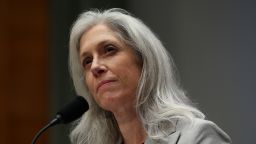Dr. Susan Monarez has officially assumed her pivotal role as director of the U.S. Centers for Disease Control and Prevention, stepping into a position that has been vacant for half a year. Her appointment comes at an exceptionally critical juncture for the esteemed public health agency, which is grappling with profound internal and external pressures. The expectations are understandably high for Monarez to navigate these turbulent waters and redefine the CDC’s trajectory during a period of significant national health policy shifts.
The agency faces substantial headwinds, notably a drastic reduction in its workforce, with nearly a quarter of its staff departing since January due to extensive cuts across federal health agencies. Compounding these workforce challenges, a proposed budget for fiscal year 2026 threatens to severely slash the CDC’s funding. Furthermore, an envisioned reorganization could strip the CDC of crucial programs, with some slated for transfer to a new Administration for a Healthy America, while others, such as the vital National Center for Chronic Disease and Health Promotion, face outright elimination, raising concerns about the future of public health initiatives.
Internal morale among CDC staff is reportedly low, casting a shadow of uncertainty over Dr. Monarez’s confirmation. While many within the agency acknowledge her as a distinguished scientist with a proven track record in leadership positions across various federal agencies, there remains a palpable sense of apprehension regarding her approach. An unnamed CDC official, speaking anonymously due to fear of reprisal, expressed disappointment that Monarez had not engaged with staff during her previous interim directorship, highlighting a desire for more direct interaction and transparency from the new CDC leadership.
Monarez brings a unique and somewhat unconventional background to the director’s office; holding a Ph.D. in microbiology and immunology, she is not a medical doctor. This makes her the first CDC director in the agency’s history to lack a clinical background, a fact that has drawn attention and discussion regarding the evolving nature of public health leadership. Her academic focus on diseases like African sleeping sickness and toxoplasmosis underscores her deep scientific credentials and a practical understanding of global health challenges.
During her Senate Health, Education, Labor, and Pensions Committee confirmation hearing, Dr. Monarez offered a personal narrative, describing herself as the daughter of a rural Wisconsin dairy farmer who self-funded her extensive education through state schools. She articulated a profound draw to public health, explaining that despite limited treatments for the diseases she researched, public health interventions dramatically reduced their impact, a philosophy that she intends to apply to broader agency challenges.
Her professional tenure reflects a bipartisan capability, having served across both Republican and Democratic administrations, demonstrating adaptability and a commitment to public service. Prior to her January 2026 arrival at the CDC, she held significant roles, including deputy director for the Advanced Research Projects Agency for Health (ARPA-H) and founding director of the Center for Innovation at the Health Resources and Services Administration. These experiences have equipped her with a robust understanding of federal health agencies and innovation within the health sector.
Amidst her confirmation, Secretary Kennedy lauded Dr. Monarez’s “unimpeachable scientific credentials,” expressing full confidence in her capacity to restore public trust in the agency. In a subsequent news release, Monarez herself articulated her privilege in joining the HHS leadership team and working alongside CDC public servants. She pledged to “strengthen and modernize the nation’s public health preparedness and response through science and innovation,” concluding with an ambitious declaration: “We will work every day at CDC to Make America Healthy Again,” setting a clear agenda for her leadership.
Interestingly, during her confirmation hearing, Monarez appeared to subtly distance herself from Secretary Kennedy on two contentious issues: vaccines and fluoride. When pressed by Senator Bernie Sanders regarding US support for the Global Alliance on Vaccines and Immunization, she firmly stated, “I think vaccines save lives. I think that we need to continue to support the promotion and utilization of vaccines,” underscoring her commitment to established health policy and evidence-based interventions. This stance highlights her dedication to scientific consensus despite broader political currents.
Experts in the field have weighed in on Monarez’s appointment, offering insights into her leadership style and the challenges ahead. Dr. Jennifer Nuzzo, director of the Pandemic Center at Brown University’s School of Public Health, praised Monarez’s ability to delve into complex policy issues and convene diverse stakeholders. Similarly, Dr. Richard Besser, a former acting CDC director, emphasized that Monarez must not only lead but actively “fight for” the agency, advocating for the tools necessary to respond to pandemics, reduce chronic disease, and address health inequities, ultimately urging her to “speak the truth, defend science, and stand up for the health of every American.”






Leave a Reply